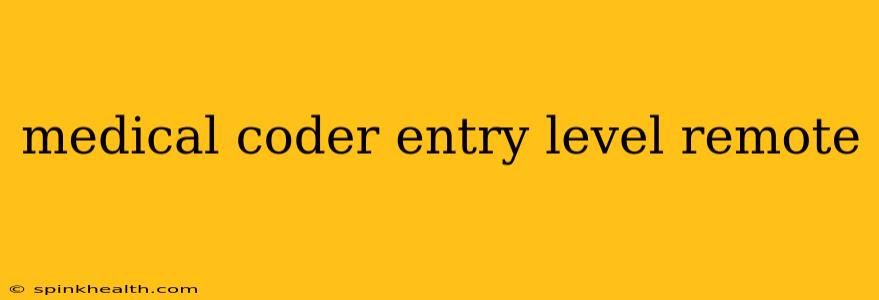The hum of the computer, the quiet satisfaction of meticulously organizing data, the knowledge that your work directly impacts patient care – this is the life of a medical coder. And increasingly, this life can be lived remotely. But breaking into the field, especially as a remote entry-level coder, can feel like navigating a complex medical chart itself. This guide will help you decipher the pathway to your dream job.
What Does a Medical Coder Do?
Before we dive into the specifics of landing a remote job, let's understand the role. Medical coders translate medical diagnoses, procedures, and services into numerical and alphanumeric codes. These codes are used for billing insurance companies, tracking patient data, and conducting medical research. Think of it as the language of healthcare finance – a critical component ensuring hospitals and clinics get paid for their services. It’s detailed work, requiring accuracy and attention to detail, making it an ideal role for meticulous individuals.
What qualifications do I need for an entry-level medical coding job?
This is a crucial question, often asked by those exploring the field. While a degree isn't always mandatory, many employers prefer candidates with an Associate's degree in Health Information Technology or a related field. However, certifications like the Certified Professional Coder (CPC) or Certified Billing and Coding Specialist (CBCS) can significantly boost your chances, even without a degree. These certifications demonstrate competency and commitment to the profession. Online courses and bootcamps provide excellent pathways to acquiring the necessary skills and certifications.
What are the best online resources to learn medical coding?
Many reputable online platforms offer medical coding courses. A quick online search will reveal a wealth of options. Look for courses that are accredited and cover all the necessary coding systems (like ICD-10 and CPT). Reading reviews and comparing curriculums will help you find the best fit for your learning style and budget. Remember to check for certification opportunities through the chosen course.
What are some tips for finding remote medical coding jobs?
The job hunt itself is a significant aspect of landing your dream remote role. Start by leveraging online job boards specifically catering to healthcare roles. Network! Connect with medical coders on LinkedIn and other professional platforms. Tailor your resume and cover letter to highlight relevant skills and experience, even if it's from volunteer work or personal projects. Emphasize your proficiency in relevant software and your understanding of medical terminology. Finally, be persistent! Landing a job takes time and effort.
How can I improve my chances of getting hired remotely?
This question often concerns applicants worried about the perceived lack of in-person interaction. Highlight your excellent communication skills in your application materials. Emphasize your ability to work independently and manage your time effectively. Remote work demands self-discipline and proactive communication, so showcase these strengths. Having a dedicated and organized workspace will also demonstrate your professionalism and commitment.
What is the salary range for an entry-level medical coder working remotely?
Salaries vary based on location, experience, and certifications. However, entry-level remote medical coders can typically expect a competitive salary range, often comparable to their on-site counterparts. Researching salary data for your specific location will provide a more accurate picture.
The path to becoming a remote medical coder may seem daunting at first. But with dedication, the right training, and a strategic job search, you can unlock a fulfilling and rewarding career in this growing field. Remember to focus on building your skills, showcasing your abilities, and networking effectively—and you'll be well on your way to cracking the code to your remote medical coding career.

